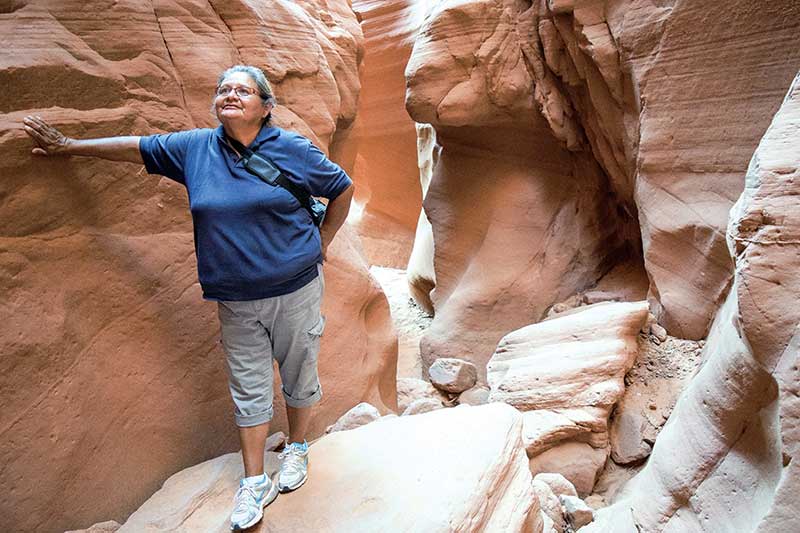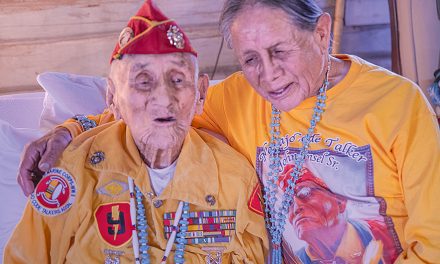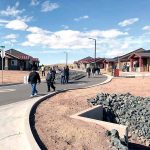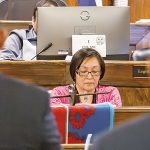
Coronavirus: Are tour guides at risk?

Navajo Times | Krista Allen
Council Delegate Paul Begay, whose wife is a tour guide, wondered if guides (like Rita Tsingine,shown in this 2016 file photo) are at risk of contracting Novel Coronavirus because of their contact with people from all over the world.
WINDOW ROCK
Roselyn Tso, Indian Health Services Navajo Area Director, told Council Delegates they are making a “robust effort” to educate their staff on the Novel Coronavirus, but there is still much to learn.
During Monday’s opening session to the 24th Navajo Nation Council’s Winter Session IHS gave a report and Tso said what still needs to be learned is how the virus is being transmitted and transported. She also noted a template that IHS is using to monitor and track those who have travelled outside of the country, since the virus was first reported to have originated from Wuhan City, Hubei Province, China.
“We know what we know in terms of what Centers for Disease Control and Prevention is putting out and what IHA is looking at,” said Tso. “We will work with the Navajo Nation, and with each of our facilities.”
Originating in China in December, the virus made its way to the United States in recent weeks, first being reported in major cities such as Seattle and Chicago. Novel Coronavirus is a respiratory virus known to cause mild to severe respiratory illness with fever, cough, and difficulty breathing.
Earlier this week Arizona State University confirmed one person in its community has the Novel Coronavirus. ASU stated the person resides in Tempe, but doesn’t live in university housing, is not severally ill (at that time) and is in isolation.
During Council’s winter session delegates began to ask what is being done on Navajo to address this virus. Health, Education and Human Services Committee member Paul Begay, who represents Coppermine, K’aibii’to, LeChee, Tonalea/Red Lake, and Bodaway/Gap told Tso he’s worried.
“This is very serious,” said Begay. “This is an international scare that is present among us right now. I heard there is one case confirmed in Maricopa County.”
The reason Begay is anxious about the virus, which is reported to have contaminated five people so far in the U.S., is because his wife works as a Slot Canyon tour guide in Lechee, Arizona. This area, as well as Page, is a popular destination for tourists, especially international tourists.
He emphasized how nervous his wife, along with other tour guides, are over the virus and he is wondering what is IHS doing. He is also concerned about the elderly who live in isolated areas, and how they can be informed and educated on the virus.
“We know the virus originated from China and that’s the kind of tourist they get at the Slot Canyon,” said Begay. “As far as we know there is no remedy for it…that’s the scary part. What is the plan? Hopefully there is a plan for it.”
Although not much is known about the virus right now, the World Health Organization declared the Novel Coronavirus a global public health emergency. President Jonathan Nez and Vice President Myron Lizer sent out a press release identifying symptoms and stating it can spread person-to-person. It can take up to two to 14 days for the virus to become active after exposure, according to the release.
“As we continue to closely monitor the coronavirus, we caution our Navajo people and encourage them to be aware of the growing spread of the virus,” stated Nez. “This is a serious public health concern that must be shared with all people. We ask that you share information with you children, elders, and others who may not have access to information via Internet, television, and other means. It’s critical that everyone take precautions and continue to learn more about the coronavirus.”
Currently, there is no vaccine available for the virus, according to the Centers for Disease Control and Prevention. The World Health Organization encourages people to avoid close contact with others showing symptoms of respiratory illness, such as coughing and sneezing, and to wash their hands with warm water and soap often, stay home if they are sick, and to minimize long-distance travel.
The coronavirus has the potential to become severe. Severe cases can also lead to pneumonia, kidney failure, and in some cases death. The most vulnerable are the elders, young children and those with compromised immune systems.








 Highway 264,
Highway 264, I-40, WB @ Winslow
I-40, WB @ Winslow